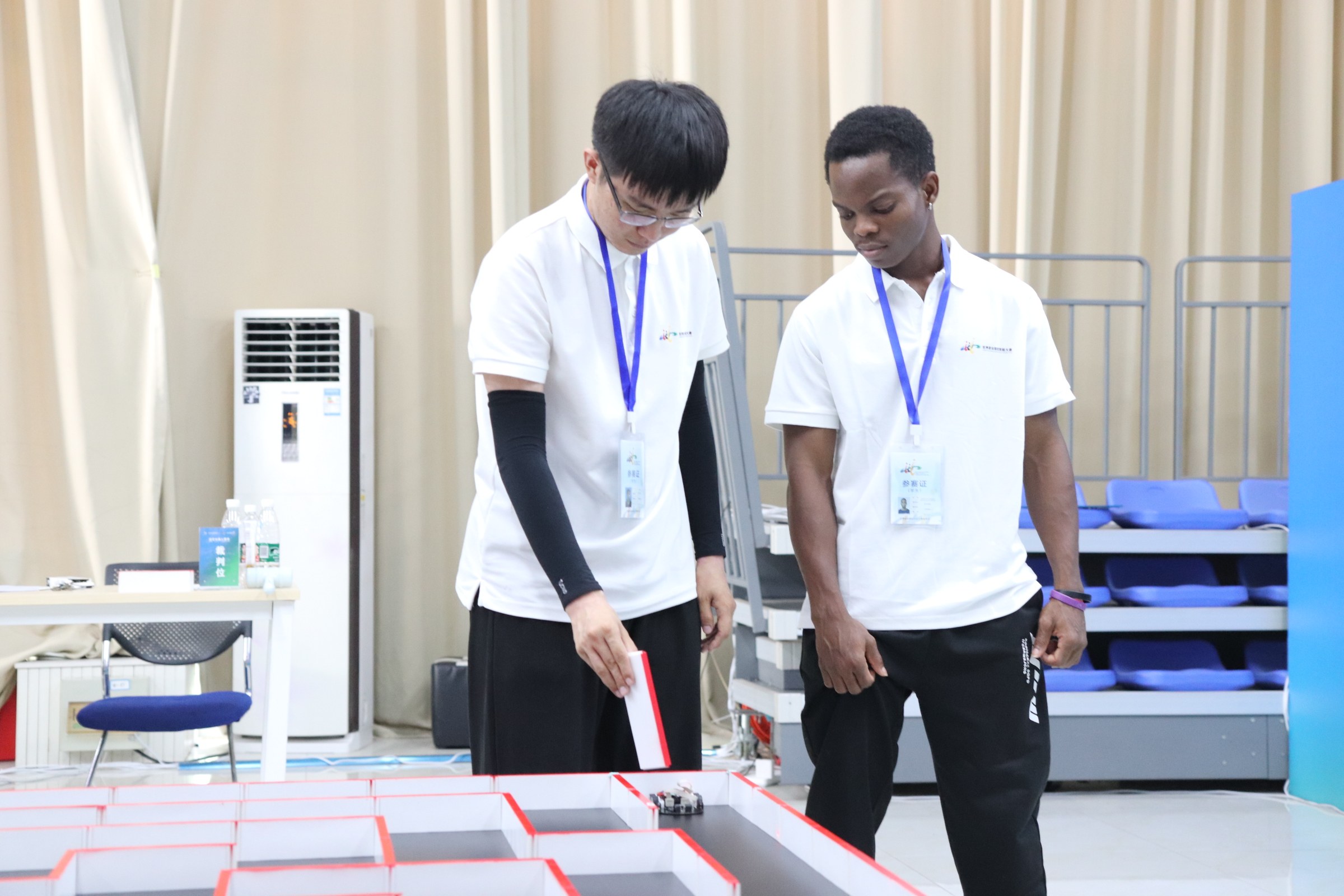

 Capo-Chichi Segnon John-Isaac Oluwaseyi, a student from Benin at Tianjin Bohai Vocational Technology College, participates in the maze robot event of the First World Vocational College Skills Competition in Tianjin on August 11(COURTESY PHOTO)
Capo-Chichi Segnon John-Isaac Oluwaseyi, a student from Benin at Tianjin Bohai Vocational Technology College, participates in the maze robot event of the First World Vocational College Skills Competition in Tianjin on August 11(COURTESY PHOTO)
Robot vehicles zip through a tabletop maze, quickly rerouting when their path comes to a dead-end, successfully reaching the destination in just a few seconds and drawing cheers from designers and spectators. This is the maze robot competition that kicked off in Tianjin Bohai Vocational Technology College (TBVTC) in the northern Chinese port city of Tianjin on August 11.
Forty-four Chinese and foreign competitors formed mixed teams that competed both online and offline. Built-in algorithms enable the robots to navigate through the twists and turns of the maze. The TBVTC team won the top place in the competition.
"Through the competition, contestants can improve their skills, which is very helpful for their future careers," Yan Kun, an associate professor at the TBVTC's Artificial Intelligence School, told the press.

"We would like to hire candidates who win prizes in these vocational skills competitions and offer them high salaries, because we especially need this type of talent," Song Lihong, Chair of Tianjin Qicheng Science and Technology Co. Ltd., told Beijing Review.
Song said these kinds of robots can be used in search and rescue in unknown environments, intelligent path planning, automatic driving, intelligent logistics and other technical fields, contributing to the development of related industries.
Increasing attention
The maze robot event was a part of the First World Vocational College Skills Competition, held onsite in Tianjin and Jiangxi Province in east China, and online as well. The competition took place on the sidelines of the World Vocational and Technical Education Development Conference, running from August 19 to 20.
Co-hosted by the Chinese Ministry of Education (MOE) and the Tianjin Municipal Government, the conference attracted some 700 participants from more than 120 countries and regions.
Chinese President Xi Jinping sent a congratulatory letter to the conference, saying China actively pushes forward the high-quality development of vocational education, and supports exchanges and cooperation with other countries in the field.
Speaking at the conference, Chinese Education Minister Huai Jinpeng pointed out that with the new round of scientific and technological revolution and industrial transformation, as well as the heavy impact of the COVID-19 pandemic, the world is experiencing profound adjustments. He said China will place vocational education in a more prominent position.
During the conference, the MOE released a report on the development of vocational education in China. The report said China regards vocational education as equally important as general education, and has accelerated the building of a modern vocational education system since 2012.
The government gives strong financial support to the sector. In secondary vocational schools, 90 percent of students have enjoyed tuition waivers, and 40 percent have received financial assistance, the report read.
As of 2021, some 1,500 vocational education groups had been launched nationwide, involving more than 30,000 enterprises and nearly 70 percent of vocational education institutions. There were also 24,900 school-company joint training bases.
More than 95 percent of graduates from secondary vocational schools, and over 90 percent of graduates from tertiary vocational institutions were able to secure a job after graduation, according to the report.
Despite the financial assistance and high employment rate, many parents are still reluctant to send their children to secondary vocation schools, largely because students receiving general high-school education have a good chance of obtaining university degrees and landing jobs generally deemed with higher social status and more decent pay in the future.
The government seeks to improve vocational education and eliminate discrimination. In May, the amended Vocational Education Law went into force. The legislation stipulates that vocational school graduates should enjoy the same opportunities for enrollment in more advanced schools, employment and career development as graduates from regular schools at the same level.
According to the MOE, as of 2021, China had 1,486 vocational colleges that do not offer academic degrees and 32 vocational universities with bachelor's degree programs. A total of 129,300 students were studying in the universities at that time.
Last year, 5.53 million students were admitted into vocational colleges and 41,400 were admitted into vocational universities. In comparison, enrolments in the 1,238 general education universities across the country totaled 4.45 million.
By 2025, vocational universities are expected to account for no less than 10 percent of total admissions to higher vocational education institutions, according to guidelines on promoting the high-quality development of China's modern vocational education, issued in October 2021.
Nanjing Vocational University of Industry Technology is among the first vocational universities, established in 2019. Wang Bo, Vice Dean of the Development Planning Department of the university, said the biggest difference between a vocational college and university lies in curriculum and training mode. He took the mechatronics major as an example, saying that a college trains students to repair machines on production lines, while a university not only trains students to repair the machine, but also to design it.
As to what majors should be offered in a vocational university, he told Guangzhou-based Southern Weekly, the decision should be based on market demand.

A robot vehicle navigates a maze in Tianjin Bohai Vocational Technology College on August 11 (COURTESY PHOTO)
Cooperation platform
The conference and skills competition in Tianjin also provided a platform for international exchange and cooperation in vocational and technical education.
Capo-Chichi Segnon John-Isaac Oluwaseyi from Benin is a student at TBVTC who participated in the maze robot event with a Chinese teammate. He said he began to prepare for the competition in May. "I have learned a lot of knowledge… and I have been learning how to communicate with my teammate," he said.
At the skills competition, students from the Luban Workshop in the United Kingdom's Chichester College demonstrated via video link the Chinese culinary skills they learned, receiving great attention.
Luban Workshops are an international network of vocational colleges run by the Tianjin Municipal Government. They provide state-of-the-art technical and vocational training and promote collaboration among vocational schools around the world.
The first Luban Workshop was established in Thailand in 2016. So far, 20 such workshops have been built in 19 countries and regions, Fang Jun, Deputy Director of MOE's Department of International Cooperation and Exchange, said at a press conference on August 17.
Twelve Luban Workshops are located in Africa. In September 2018, China committed to establishing 10 Luban Workshops in Africa under the framework of the Forum on China-Africa Cooperation, and that commitment has been more than fulfilled. Workshops have also been set up in other countries, including India, Indonesia, Pakistan and Portugal.
In addition to Luban Workshops, China has also launched a "Chinese language plus vocational education" project in more than 40 countries and regions, Fang said. The project helps other countries participating in the Belt and Road Initiative to train skilled technical personnel and continue to increase industrialization, he added.
(Print Edition Title:Vocational Talent Show)
 Back
Back









